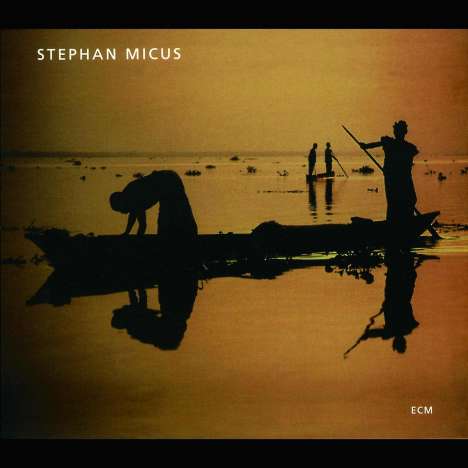Stephan Micus: The Garden Of Mirrors auf CD
The Garden Of Mirrors
Herkömmliche CD, die mit allen CD-Playern und Computerlaufwerken, aber auch mit den meisten SACD- oder Multiplayern abspielbar ist.
- Label:
- ECM
- Aufnahmejahr ca.:
- 1995-96
- Artikelnummer:
- 8172668
- UPC/EAN:
- 0731453716223
- Erscheinungstermin:
- 1.10.2009
Don Cherry, the late great American trumpeter, used to say that to play an instrument from another culture properly, the musician must first understand the tradition of that instrument and then go beyond it to find his own voice. This way of thinking has much in common with the philosophy of Stephan Micus (b. 1953, Germany), who has been travelling the globe studying and playing traditional instruments from numerous cultures (East and West) since the age of 16. Indeed, for Micus there has always been more to music than just the notes. It is of paramount importance to him to study a given musical instrument in its country of origin where it is then possible to observe and absorb the culture through its arts, religion, climate, right down to the clothes the indigenous folk wear and the food they eat. But, don’t confuse his passion for age-old non-Western instruments with a desire to play ethnic musics. This he strenuously denies. Like Cherry, Micus is concerned to express his own voice, though his way of doing it is by combining acoustic instruments from unrelated cultures and from different historical periods that have never been played together before. Here lies the key to his unique and enigmatic soundworld.
Of course, a singleminded, idiosyncratic vision like his doesn’t fit snugly within the world of commerce. For the market-orientated, or those critics obsessed by taxonomical tags, Stephan Micus continues to be a hard man to pin down. However, this fact simply reflects Micus’ talent for creating a rich, culturally diverse music that challenges the need for categories, and thrives in a place where boundaries blur, or disappear altogether.
“My music reflects the contemporary world,” he claims, “where one can travel easily and experience different cultures, or just go into a store and find examples of all these different musics.” Micus’ use of traditional instruments expresses some of the many possibilities which now exist for interaction between various cultures.
The Garden Of Mirrors, his fourteenth solo album, continues a structural theme most evident on albums since the late 80s, that of giving special prominence to a particular instrument. On Twilight Fields (1988, ECM 1358) it was tuned flowerpots; on The Music Of Stones (1989, ECM 1384), the resonating stone sculptures of Elmar Daucher; Darkness And Light (1990, ECM 1427) featured the bowed Indian dilruba, and for To The Evening Child (1992, ECM 1486) Micus sensitively revealed the meditative qualities of the Caribbean steeldrum, an instrument best known for its exuberant role in calypso. The Garden Of Mirrors showcases two traditional African harps, the bolombatto (gut strings) and sinding (hemp strings), which Micus first encountered eight years ago in Gambia, where he studied them with the help of local musicians. However, he’s keen to point out that the compositions on the album are not African music, though “to a certain extent the harps create this sort of African ambience, conveying the essence of their culture. They give the music a physical quality. They speak directly to the body, making this one of my most rhythmic albums. I’ve never before used instruments which produce such low tones, they’re like a primitive bass. As I played these harps I automatically felt closer to the roots of black American music. The way black American musicians have used the double bass in jazz has its roots in these harps.”
In fact, the rhythmic presence of the harps enhances the song-like shape of certain pieces; if the a cappella multitracking on Athos (1994, ECM 1551) suggests plainchant, the poignant refrains of “Violeta” and “Night Circles”, accompanied by the deep tones of the sinding, recall the black township choirs of South Africa. In sharp contrast, “Mad Bird” for solo Irish tin whistle, and “Flowers In Chaos” for 22 Balinese suling, explore high-register woodwind timbres — the latter piece resulting in some pretty frenzied activity. Micus closes the album with “Words Of Truth”, a superbly atmospheric arrangement for six shakuhachi, subtly blending melodic expressivity and haunting drones with windswept overtones. - Chris Blackford
Pressestimmen:
When encountering the music of another culture, most Western musicians adapt by learning to play the instruments native-style and mimicing the music of that culture. But from the very beginning, Micus had his own direction and his own voice. He created his own very distinctive music, and though he used acoustic instruments from many cultures, he did it in ways they never dreamed of – rebuilding instruments, changing tunings, and playing them in idiosyncratic ways. And famously, he mixed instruments from around the world, or used whatever was at hand: stones, ordinary flowerpots tuned with water, and his voice – singing non-verbal improvised sounds over ten years before others made this approach fashionable. The Hearts of Space US nation-wide radio program
This extraordinary multi-instrumentalist is actually one of the few to have grasped in its essence what was the song of the world. With him there exist no territories or cultural atavisms, but a planetary polyphony projected on a horizon of eternity. His instruments exchange once more the out-lines of their countries of origin to become instruments without nationality in the hands of this nomad musician. Exceptional. Keyboards, France
Micus's music possesses gossamer beauty. Timeless, magical music with a universal appeal. The Times, UK
Listening to the music of Stephan Micus – which is as itinerant and wide ranging as his life – is one of the most profound experiences possible today. Beyond categories and labels, this German artist was already way ahead of trends when he released his first album in 1976. Fifteen recordings later The Garden of Mirrors, his first CD since the phenomenal Athos, seems on the surface to be heading in a stylistic direction pointing towards the Orient. But upon further listening it’s clear Micus is exploring an internal universe governed by natural elements on the one hand and, paradoxically, by silence on the other. “Passing Cloud”, “Gates of Fire” and “Words of Truth” are the titles Micus uses to name pieces that elaborate his personal liturgy and interpret the movement of water and wind, the flight of clouds and the voices of the spirit. An intrepid traveller and perpetual student, he has learned to play ancient and rare traditional instruments that are as evocative as they are esoteric. When he sings he sounds like a chanting mystic in a trance. The Garden of Mirrors is a recording to be experienced the way one would a journey, the type of voyage Bruce Chatwin would describe as “looking inward”. La Repubblica, Italy
The music of Stephan Micus is something completely new and entirely ancient and al-together embracing of humankind. If it isn’t heaven, it sounds somewhere near it. Detroit Free Press, USA
Before there was world music, there was Stephan Micus, playing instruments from Afghanistan, India, and Indonesia. But ever since his first album (released in 1976) the German composer has not been making world music but other – worldly music. He plays ethnic instruments in nontraditional ways, multitracking them in layered arrangements and creating meditative excursions. Stephan Micus isn’t pan-cultural but transcends culture with music that’s innocent but not naive. Billboard, USA
Fascinating music, where silence has its place. Midi Libre, France
Micus has a natural aptitude for taking ethnic sounding instruments and playing them in a manner that places them outside their traditional context. Sounds, England
Wistful, sweet-sad melodies, warm, glo-wing chords, shadows become sound; strands of light are tuned and strummed … a truly original voice, suffused with a mysticism that is equal parts Western and Eastern. Rolling Stone, USA
A sensitive, distinguished and finely balan-ced music of rather subtle dynamic which expresses a meditative quality of listening. Neue Zürcher Zeitung, Switzerland
On Garden of Mirrors he preserves the same virtues of his first works: freshness, imagination and a talent for intercultural synthesis. El Pais, Spain
Micus masters the art of musical simplicity. Die Weltwoche, Switzerland
Micus‘ style of singing is comparable to a universal language, to a transcultural code, as if participating in all languages and transcending them at the same time. Basler Zeitung, Switzerland
Stephan Micus is inspired and abandoned, unself-conscious and disciplined all at once, producing dazzling sound and exquisite melodies. It’s ancient-sounding, witchcraft kind of music, music that’s innovative and entirely contemporary in its disturbing directness, a work of genius indeed, a unique talent, a painter of soundscapes, one of Europe’s strongest and most original soloists. Fanfare, USA
Rezensionen
M. Schmidt in Stereo 9/97: "Micus kommt nie auch nur in die Nähe zum Kitsch, sondern schwelgt so gekonnt in Bildern, daß man sich fragt, wieso noch keiner auf die Idee kam, den Mann für einen Soundtrack anzuheuern."Disk 1 von 1 (CD)
-
1 The Garden Of Mirrors: Part 1: Earth
-
2 The Garden Of Mirrors: Part 2: Passing Cloud
-
3 The Garden Of Mirrors: Part 3: Violeta
-
4 The Garden Of Mirrors: Part 4: Flowers In Chaos
-
5 The Garden Of Mirrors: Part 5: In The High Valleys
-
6 The Garden Of Mirrors: Part 6: Gates Of Fire
-
7 The Garden Of Mirrors: Part 7: Mad Bird
-
8 The Garden Of Mirrors: Part 8: Night Circles
-
9 The Garden Of Mirrors: Part 9: Words Of Truth
Mehr von Stephan Micus
-
Stephan MicusLifeCDVorheriger Preis EUR 16,99, reduziert um 0%Aktueller Preis: EUR 15,99
-
Stephan MicusMusic Of StonesCDVorheriger Preis EUR 16,99, reduziert um 0%Aktueller Preis: EUR 15,99
-
Stephan MicusDesert PoemsCDVorheriger Preis EUR 16,99, reduziert um 0%Aktueller Preis: EUR 15,99
-
Stephan MicusTowards The WindCDVorheriger Preis EUR 16,99, reduziert um 0%Aktueller Preis: EUR 15,99






